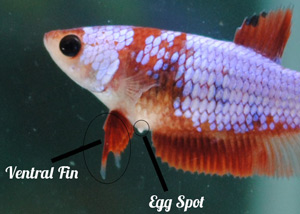Egg Spot Betta
Betta fish are notoriously fascinating aquarium pets due to their bright colors and striking fins. However, there is more to betta fish than what meets the eye. In this article, we will dive deeper into one unique characteristic of betta fish, the egg spot betta.
As betta fish owners, we all want to give our pets the best care possible. However, it can be challenging to identify and address problems that our fish encounter. Some common pain points that betta fish owners face are egg-binding, bloating, and abnormal behavior. Thankfully, egg spot betta fish can provide insight into some of these problems.
So, what exactly is an egg spot betta? Egg spots are small white or yellow dots located on the ventral side of a betta fish, near the anal fin. These spots are more visible in female bettas and are a sign that they are ready to spawn. Egg spots play a crucial role in the mating process, and a male betta fish will mistake them for actual eggs and begin to build a nest.
In summary, egg spot betta is a term used to refer to tiny white or yellow-spotted areas near the anal fin of a female betta fish. These spots are pivotal in the mating process and spark the male betta's instinct to build a nest.
Egg Spot Betta's Target: Understanding the Mating Process
I vividly remember the first time I saw egg spot bettas on my female betta fish, Bubbles. I was baffled and had no idea what they were, but after some research, I discovered that these mysterious spots played an important role in the mating process. The sight of egg spot bettas made me curious to know more about my fish and their behavior.
Egg spot betta is a crucial indicator of a female betta's ability to mate. While most fish lay eggs and let nature take its course, betta fish have a unique way of spawning. Understanding the mating process of betta fish is vital for pet owners to identify and address egg-binding, bloating, and abnormal behavior.
The Process of Mating
When betta fish mate, the male and female engage in a specific set of behaviors. The male builds a nest usually located at the top of the water in the aquarium using his saliva, creating bubbles that form a nest. Once the nest is complete, the female betta lays her eggs. As she lays the eggs, the male fertilizes them, and they stick to the bubbles in the nest. The male then continues to care for the eggs and newly hatched fry until they are capable of swimming on their own.
What Are The Signs of Egg-Binding?
Good care of your betta fish involves understanding the signs of illness or discomfort in your pet. When your female betta is egg-bound, she will not allow the eggs to come out, and they can quickly become stuck. As a result, the fish may display a larger and unnaturally swollen belly. Other symptoms to look out for include unusual swimming behavior and appetite loss.
Tips for Caring for Egg-Your Egg-Bound Betta Fish
If your betta fish is egg-bound, there are several things you can do to care for your pet. One of the essential steps is to change 50% to 70% of the tank water and add aquarium salt. Also, ensure to include plants in the tank to provide hiding spots for the fish. Consult a veterinarian if the symptoms continue, which may involve manual removal of the eggs.
Frequently Asked Questions
Q: Can male bettas have egg spots?
A: No, males do not have egg spots, as their primary role in spawning is to fertilize the eggs laid by the female betta.
Q: What do I do when my betta fish female has egg spots?
A: Ensure to change the tank water and provide hiding spots for the fish to reduce stress. Also, include a male betta fish in the tank to stimulate the mating process if you intend to breed the fish.
Q: Can betta fish die from bloating?
A: If left unaddressed, bloating can lead to complications such as swim bladder disorder, which could cause death. Consult a veterinarian if you notice abnormal behavior in your pet.
Q: How often should I change my betta fish tank water?
A: Betta fish require clean water to thrive, and it is advisable to change water at least once a week, with a 50% to 70% water change to prevent the accumulation of ammonia and nitrites in the tank.
Conclusion of Egg Spot Betta
Understanding the egg spot betta is essential for betta fish owners to provide the best care for their pets. With proper care, betta fish can be fascinating and rewarding aquarium pets, and knowing the egg spot bettas' significance is one small step towards proper care.
Gallery
Is My Betta Fish Pregnant? Signs And Symptoms Of An Expectant Betta

Photo Credit by: bing.com / betta fish pregnant female egg spot ovipositor
Pin On Betta

Photo Credit by: bing.com / betta fish colorful aquabid
Is My Female Betta Fish Pregnant? | Bloated OR Egg Bound 🤔 - YouTube

Photo Credit by: bing.com / betta bloated
Betta - Watching After His Clutch Of Eggs - YouTube

Photo Credit by: bing.com / betta
October 2012 ~ Nice Betta

Photo Credit by: bing.com / female betta fish male egg if spots fins look ovipositor short plakat belly tail da they between females
